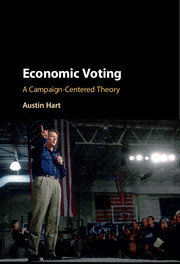Book contents
- Frontmatter
- Dedication
- Contents
- List of Figures
- List of Tables
- Acknowledgments
- 1 The Economic Voting Puzzle
- 2 A Campaign-Centered Theory of Economic Voting
- 3 Can Ads Prime the Economy? How Would We Know? US 1992
- 4 The Impact of a Surge in Economic Messages: Mexico 2006
- 5 The Absent Economic Message: US and Mexico 2000
- 6 The Campaign-Centered Model in Comparative Perspective
- 7 Conclusion
- Appendix
- References
- Index
4 - The Impact of a Surge in Economic Messages: Mexico 2006
Published online by Cambridge University Press: 05 September 2016
- Frontmatter
- Dedication
- Contents
- List of Figures
- List of Tables
- Acknowledgments
- 1 The Economic Voting Puzzle
- 2 A Campaign-Centered Theory of Economic Voting
- 3 Can Ads Prime the Economy? How Would We Know? US 1992
- 4 The Impact of a Surge in Economic Messages: Mexico 2006
- 5 The Absent Economic Message: US and Mexico 2000
- 6 The Campaign-Centered Model in Comparative Perspective
- 7 Conclusion
- Appendix
- References
- Index
Summary
With 108 days to go before the election, Mr. López Obrador appears to have consolidated his position as the front-runner, and many political strategists now predict he will win unless he stumbles spectacularly.
– New York Times, March 19, 2006On July 2, 2006, Mexican voters elected Felipe Calderón of the incumbent National Action Party (PAN) by the narrowest margin of victory in the country's history: a mere 0.58 percent of the official vote. In the tumultuous months that followed, the Federal Elections Tribunal certified the controversial results amidst serious allegations of fraud. The PAN standard-bearer was sworn in despite physical brawls on the floor of the Chamber of Deputies and massive street protests led by defeated leftist challenger Andrés Manuel López Obrador of the Party of the Democratic Revolution (PRD).
The left was shocked. Calderón was a long shot, not even the favorite to win the PAN primary let alone the general election. As the opening quote to this chapter hints at, some observers initially predicted he would finish in third place, behind Roberto Madrazo of the Institutional Revolutionary Party (PRI). The double-digit lead maintained by the charismatic and wildly popular López Obrador through most of the campaign made Calderón's eventual comeback even more improbable. Yet, Calderón emerged victorious from a bruising campaign remembered for its focus on economic themes. How did he snag victory from the jaws of almost certain defeat?
Calderón's comeback aside, what makes this case so important in the present study is the sudden wave of economic campaign ads that were released in the middle of the campaign. These economic messages eventually came to characterize this bruising contest, yet they were notably absent in its early stages. The sudden emergence of economic issues in late March was catalyzed by a dramatic shift in Felipe Calderón's communication strategy. Behind in the polls by ten points and unable to close in on López Obrador, Calderón suddenly moved to “activate” the economic vote. He fired his chief advisor, spent $20,000 on a weekend consultation with American strategist Dick Morris, and adopted “the economy” as the centerpiece of his message (notably without any shift in objective economic context).
- Type
- Chapter
- Information
- Economic VotingA Campaign-Centered Theory, pp. 75 - 94Publisher: Cambridge University PressPrint publication year: 2016



